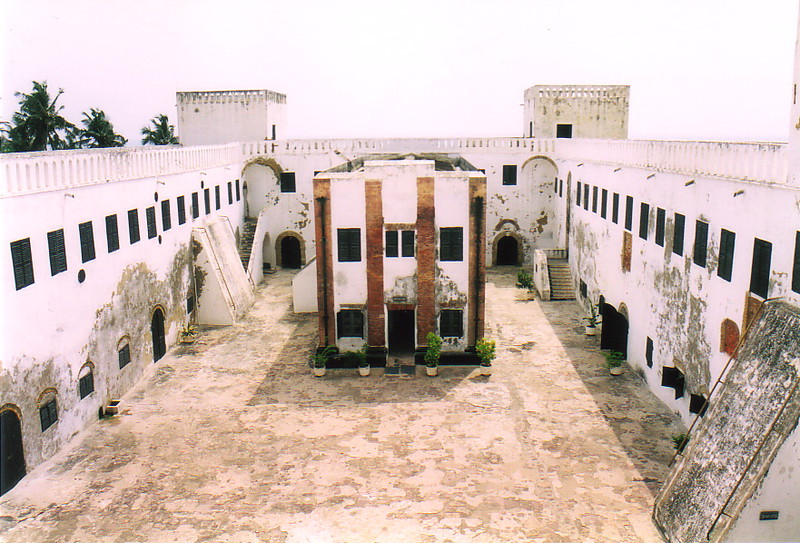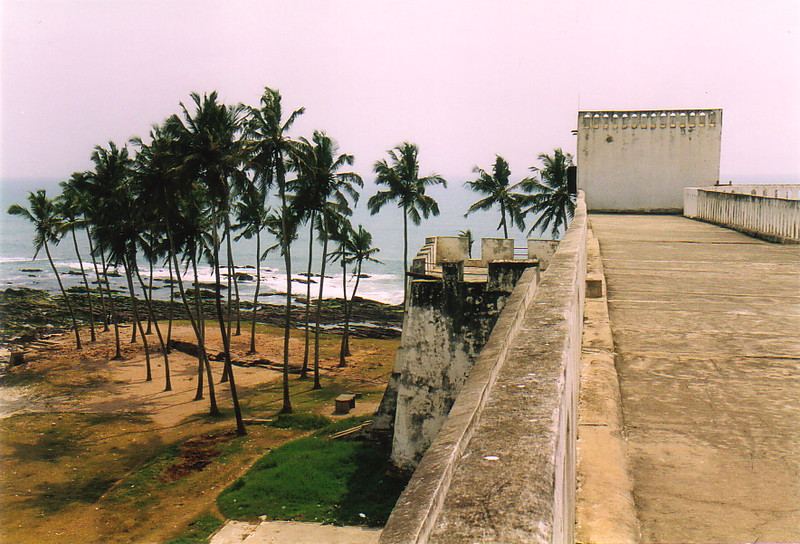
If I hadn't been told of the existence of the Prempeh Room I would never have spotted it, but thanks to an off-the-cuff comment by Mr Prempeh back in Accra, I knew what to look for. And so I discovered that St George's Castle has a link to the Prempeh family, which helped make a fascinating castle even more enthralling.
First, some background history. During the 17th century the influence and power of the Kumasi-based Ashanti tribe grew considerably, mainly due to their interests in the burgeoning trade in gold and slaves. Before long the Ashanti nation decided it wanted to cut out the middleman in its transactions with the Europeans, and through an alliance between the Ashanti, the Edina and the Dutch, Elmina was picked as the main port for Ashanti trading.
This wasn't the end of Ashanti ambitions, and an attempt in 1807 by the Ashantis to invade Cape Coast didn't quite work out as planned, as the Fante tribe in Cape Coast formed an alliance with the British against the Edina-Ashanti-Dutch trio. In 1873 the Ashantis got their revenge when they marched south and defeated the Fante, but in retaliation the British marched north, invading the Ashanti homeland and capturing Kumasi. This led to the 1874 Treaty of Fomena, which forced the Ashantis to pay a war indemnity in gold to the British and to give up all claims to Elmina.
In 1888 the British confirmed the installation of a new Asantehene, the king of the Ashantis. Kwaku Dua III, also known as Nana Akwasi Agyeman Prempeh I, was enstooled on 28 March at the age of 16. King Prempeh I was Mr Prempeh's grandfather, and as I stood there in the museum at St George's Castle, studying the large picture of Prempeh I on display, I could genuinely see the likeness. This was fun.

But why is there a picture of Mr Prempeh's grandfather in St George's Castle in the first place? The story goes that in 1894 the British were getting worried that the Ashantis might want to try to revive their erstwhile empire, and they were concerned that the Ashantis might do this by siding with the French or the Germans, who at that time controlled the countries surrounding the Gold Coast; the French were in the Ivory Coast to the west and Upper Volta to the north, and the Germans were in Togoland to the east. To help prevent this, the British asked the Asantehene – Mr Prempeh's grandfather – to accept British protection, to install a British Resident in Kumasi and to receive official payment for himself and his chiefs. In the Ashanti Union sent a delegation of over 300 people to Britain to discuss the issue, but while they were in transit Governor William Maxwell issued an ultimatum demanding that King Prempeh accept a British Resident immediately, and that he pay a war indemnity of 50,000oz in gold, dating back to 1873.
King Prempeh promised to pay part of the indemnity immediately and the rest in instalments, but this gesture was too late; on the British arrested him, along with his father, his mother, his brother, two close relatives, some paramount chiefs and some military captains, and had them exiled to St George's Castle in Elmina. The room in which the king was held is now called the Prempeh Room, and it sits right on top of the southeastern corner of the castle, an unassuming white block that's balanced by a similar room on the southwestern corner of the battlements.
Unfortunately, structural damage to the castle means that the Prempeh Room is currently closed to the public, but I could still see it across the courtyard, concrete evidence of the role of the Prempehs in Ghana's colourful history. From here Mr Prempeh's grandfather was first exiled to Freetown in Sierra Leone, and then to the Seychelles; it wasn't until 1924 that he finally returned home to Kumasi.
It might pale into insignificance compared to the suffering of the crowds of slaves who passed through St George's Castle on the way to the New World, but looking at the lonely Prempeh Room, you can imagine the awful realisation that must have hung heavy on the king's shoulders. Exile is a terrible thing, whether you're being exiled to the Seychelles or to the plantations of the Americas, and being exiled as a king must be a difficult cross to bear.
Thankfully, Mr Prempeh's grandfather lived to return home, unlike the poor souls who were shipped out from the dungeons, three floors below. For them, an anonymous death was as good as it got; at least Prempeh I got his stool back.